In Our Rochester Office, We Perform Proven Allergy Testing Methods to Discover the Source of Your Discomfort
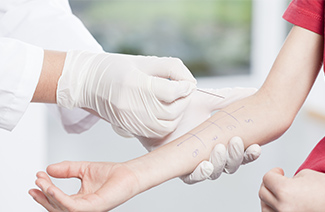 The standard method for allergy tests is called skin testing, or scratch testing.
The standard method for allergy tests is called skin testing, or scratch testing.
Scratch tests are able to detect immediate sensitivity towards foods and inhaled allergens, such as pollens of trees, grasses, weeds, molds, or animals. For adults, skin testing is performed using a device called a Duotip. It is a plastic toothpick-like device, which is dipped in the solution of allergen and subsequently applied to the skin, where small scratches are made. After a 15-minute wait, the test is read with a positive reaction resembling a small mosquito bite.
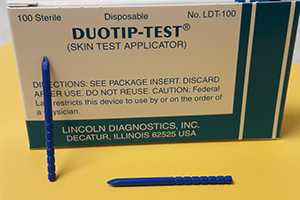
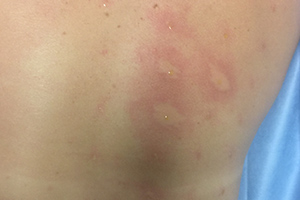
How to Prepare for the Allergy Skin Test:
- Make sure not to take any allergy medications (for example, Benadryl, Zyrtec, Allegra, Claritin, or any other allergy medications) or decongestants for 2 days before your test. Allergy medications can block test results, resulting in the need have your appointment rescheduled.
- Make sure to wear a loose-fitting top that can be removed, since the test will be performed on your back and arms.
- There are no fasting or diet restrictions. You can eat normally before coming for your test.
- Your appointment will last between 1.5 to 2 hours.
- We highly recommend that you check with your insurance company prior to your appointment to see if you have allergy testing coverage (and to understand what your copay, coinsurance, and/or deductible responsibility might be if that applies).
Allergy Skin Testing vs. Other Allergy Testing Methods
The process of an allergy evaluation starts with a detailed history. We cannot stress enough that this is by far one of the most important points in the evaluation of allergies, which is to find out what in the environment causes a patient’s symptoms. Subsequently allergy tests are performed and can be done in a couple of different ways.,
Many times primary care physicians or physicians who are not specifically trained in allergy evaluation perform blood testing. There are a couple of blood tests available, the CAP test and the RAST test. Out of those, the CAP test is much more sensitive, specific and efficient than the RAST test. However, the CAP test has a less sensitivity than the golden standard which is skin testing.
Obviously, all blood tests involve drawing blood from the vein, which may be much more traumatic especially for younger children than simple skin testing. Some of the physicians also order IgG testing for the evaluation of food allergies. This test measures the amount of IgG type of antibodies to foods. According to a statement from Medicare, the American Academy of Allergy Asthma and Immunology, as well as research, there is no evidence that there is any correlation between elevated levels of IgG antibodies and allergy.
To this day the golden standard of allergy testing is the skin test which provides quick, reliable and more sensitive assessment of the sensitization to different allergens than any of the blood tests.
The following tests are considered by Medicare to be medically unnecessary:
- Provocative Testing
- Blood, Urine or Stool Micro-nutrient Assessments
- Qualification of Nutritional Assessments
- IgG (ELISA) Tests
- Environmental Cultures and Chemicals
- Live Cell Analysis
- Passive Transfer
- Rebuck Skin Window
- Leukocyte Histamine Release
- Metabolic Assessments
- General Immune System Assessments
- Secretory IgA (Saliva)
- Qualitative multi-allergen screen
- Food Allergenic Extract Immunotherapy
- Cytotoxic Food Testing
Pediatric Skin Testing
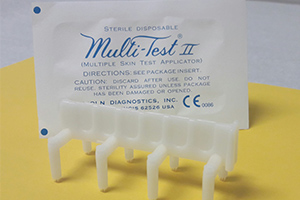 For kids, the test is performed by a “Multi-Test” device that allows for testing of up to eight allergens with a single touch to the skin. It is important for parents to realize that, just like with any other test, or for example, vaccinations, kids may not appreciate being touched by nurses, and they may need to be temporarily restrained.
For kids, the test is performed by a “Multi-Test” device that allows for testing of up to eight allergens with a single touch to the skin. It is important for parents to realize that, just like with any other test, or for example, vaccinations, kids may not appreciate being touched by nurses, and they may need to be temporarily restrained.
How to Prepare your Child for the Pediatric Skin Test:
- Make sure your child is not taking allergy medications (for example, Benadryl, Zyrtec, Allegra, Claritin, or any other allergy medications) or decongestants for 2 days before the test so that the test results are not blocked, and to avoid having to reschedule your child's appointment.
- Make sure your child is wearing a loose fitting-top that can be removed since the test will be performed on the back.
- There are no fasting or diet restrictions. Your child can eat normally before coming in for the test.
- If you have two children that are scheduled for testing at the same time, we ask that you bring another adult. Each child will be in a separate room for their test, so two adults are needed to supervise and make sure they’re comfortable.
- Your child's appointment will last between 1.5 to 2 hours.
- We highly recommend that you check with your insurance company prior to your appointment to see if your child has allergy testing coverage (and to understand what your copay, coinsurance, and/or deductible responsibility might be, if that applies).
Patch Testing
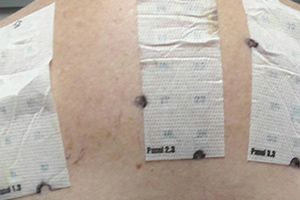 Another form of testing is the “Patch” test. This test is performed to find delayed-type of sensitivity to metals and commonly encountered chemicals used in cosmetics, hygiene products, textiles, hair dyes, etc. This test is performed by applying band-aids, which are pre-soaked with solutions of tested chemicals, and subsequently kept on the skin on the back for 48 hours. After 48 hours, the patch is removed and the first reading takes place. The test is read for the second time at 72 hours.
Another form of testing is the “Patch” test. This test is performed to find delayed-type of sensitivity to metals and commonly encountered chemicals used in cosmetics, hygiene products, textiles, hair dyes, etc. This test is performed by applying band-aids, which are pre-soaked with solutions of tested chemicals, and subsequently kept on the skin on the back for 48 hours. After 48 hours, the patch is removed and the first reading takes place. The test is read for the second time at 72 hours.
How to Prepare for the Patch Test:
- The patch test consists of 3 visits during the same week. At the first visit, the patch test will be applied (scheduled only on Tuesdays), followed by a patch read on Thursday and Friday (48 hours and 72 hours after the patch is applied) to determine if there is any reaction from the test.
- Make sure you are not taking any steroids since this can interfere with the patch test results. If taken, they need to be stopped for at least a week before patch testing.
- Make sure to not put any creams or lotions on your back since this is where the patch test will be applied.
- There are no fasting or diet restrictions. You can eat normally before coming for the patch test.
- After the patch test is applied you will be instructed to avoid getting the patch wet until it is taken off at our office on Thursday in order to avoid ruining the test.
- Your first appointment will last about an hour. The second and third appointments are short (about 5 to 10 minutes, once you see the doctor).
- We highly recommend that you check with your insurance company prior to your appointment to see if you have coverage for patch testing (and to understand what your copay, coinsurance, and/or deductible responsibility might be, if that applies).






